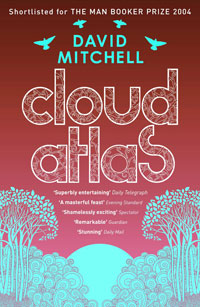Think of a Italo Calvino's
If on a Winter's Night a Traveller. Now think of Kim Stanley Robinson's
The Years of Rice and Salt.
Cloud Atlas by David Mitchell (no, not that David Mitchell) is not their secret love child, but I have a sneaking suspicion that those two books are its crazy aunts (at opposite ends of the family tree) at least.
It takes the experimentation with different forms of narrative and different forms of language from the one, and the overarching idea of travelling souls as a way of holding together a (set of) narrative(s) spanning a long period of history from the other. The combination, of course, makes something new and very different from both (do you look like your crazy aunts?), and it is a strange thing to read. In a nice way.
I don't feel that I am giving away anything important in pointing out the travelling souls concept. In part because it is so blatantly obvious from early on, in part because it is mentioned whenever and wherever the book is reviewed elsewhere (everyone else does it!), but mainly because it is something the book sets up only to puncture enthusiastically in its sequence of narratives; at last one character comment on it as a preposterously clichéd device.
It is an odd book, but I keep thinking it wasn't quite odd enough. It seemed to restrain itself from going off into crazy land. And its main problem are the first and last narratives. Allow me to explain.
The structure of the novel is as follows: There are six narratives. The first five break off half-way through. The sixth is told in its entirety, and is then followed by the first five, starting with the one closest to the sixth in time and going backwards. The first and last narratives are therefore the same. A visual aid, you say?
Pacific Journal | Frobisher | Luisa | Cavendish | Sonmi | Sloosha's Crossing | Sonmi | Cavendish | Luisa | Frobisher | Pacific Journal
Most of the other narratives were wonderfully enjoyable. The language of Frobisher was delightful (1930s dandy, musician and conman), the story of Luisa (a thriller about an intrepid journalist fighting an evil company) light but exciting, Timothy Cavendish (old man landed in bad circumstances) was grumpy and funny (even if it took its funny a little far at times), the dystopian Sonmi-section had me thinking it was just an annoying satire using old tropes until it convinced me it was not and it became a fully fledged story of its own (I loved how Orwell and Huxley were described as ``the optimists''), and then the middle part...
I said the language changed, and while that is true of the first four, it is more a matter of a variety of styles that are recognisable to us. In the Sonmi-section language became different (simplified spelling and brand names as general nouns, mainly), and in ``Sloosha's Crossing'' it was taken even further. This is the main reason why I am reluctant to recommend the book to people who are not fluent in English. I had trouble getting into this part of the book in the beginning, as it seemed to be based on Hawaiian dialect and then taken to extremes in isolation over hundreds of years. It would be very interesting to get a linguist to comment on that particular bit (Tim? I am sure Rebekah has been telling you to read this book) -- is it realistic in its development of language?
At any rate. The first and last bits were the weakest of the book, I thought. It did not catch my interest terribly in the beginning, and it didn't blow me away with its moralising at the end. I am torn on this, however. On the one hand, the moralising is weak. On the other, it is again put into play by the fact that we ``know'' how the world was to develop. If this is taken as a worst case scenario that we should learn by, then the book becomes weaker because of its harping on message. If it is taken as an ironic twist to the hope of betterment, the book somehow feels better.
That said, the first narrative had to be there, as it lays the ground for the development of the Nietzschean idea of eternal return, which ties the narrative together on a thematic level (an in a much more convincing way than the travelling souls device).
Rebekah was right to call it a
tour de force, and it is a very enjoyable read. But while I really liked it, I have this nagging feeling that something is out of place. Perhaps that is the point.


Comments